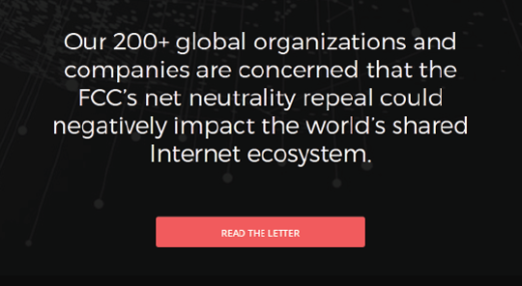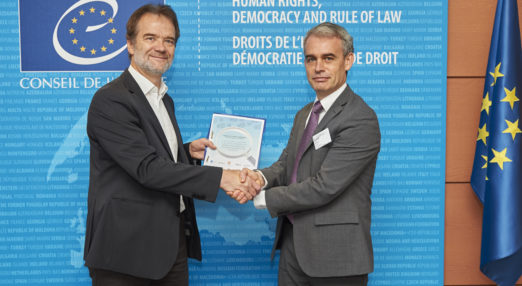Global
Filter by...
-

The EU should regulate AI on the basis of rights, not risks
EDRi's member Access Now explains why the upcoming legislative proposal on AI should be a rights-based law, like the GDPR. The European Commission must not compromise our rights by substituting a mere risk mitigation exercise by the very actors with a vested interest in rolling out this technology.
Read more
-

Nearly 100 public interest organisations urge Council of Europe to ensure high transparency standards for cybercrime negotiations
In light of the passing of the CLOUD Act in the United States that undermines the rights to privacy and other rights, the forthcoming proposal of the European Union on e-evidence, and other initiatives, it is vitally important that the T-CY listens to and engages with civil society proactively and in a timely manner. Civil society wants to engage in this process to ensure the new protocol will uphold the highest human rights standards.
Read more
-

2017: From EDRi to the world
2017 was a busy year for digital rights defenders. To advance our mission to defend and promote your rights to privacy, data protection, and freedom of information, expression and opinion, we worked hard to engage with European level decision-making, but also did our best to get out of the Brussels “EU bubble” and enhance digital […]
Read more
-

Letter to the FCC: The world is for net neutrality
Today, 26 September 2017, European Digital Rights (EDRi) and over 200 other civil society organisations and businesses joined forces to send a letter to the head of the US Federal Communications Commission (FCC) with a clear message: the world is for net neutrality. In the letter, we express concerns about the negative impact the rollback […]
Read more
-

Cross-border access to data has to respect human rights principles
The Council of Europe started preparing an additional protocol to the Cybercrime Convention – a new tool for law enforcement authorities (LEAs) to have access to data in the context of criminal investigations. Ahead of the first meeting of the Drafting Group, EDRi coordinated a civil society submission, signed by 14 organisations from around the […]
Read more
-

Cross-border access to data: EDRi delivers international NGO position to Council of Europe
Today, 18 September 2017, a global coalition of civil society organisations, led by European Digital Rights (EDRi), submitted to the Council of Europe its comments on how to protect human rights when developing new rules on cross-border access to electronic evidence (“e-evidence”). The Council of Europe is currently preparing an additional protocol to the Cybercrime […]
Read more
-
Netherlands: legislation for forced decryption announced
This article is also available in: Deutsch: [Niederlande: Zwang zur Entschlüsselung geplant | https://www.unwatched.org/EDRigram_10.23_Niederlande_Zwang_zur_Entschluesselung_geplant?pk_campaign=edri&pk_kwd=20121205] The Dutch Minister of Justice has sent a letter to the House of Representatives announcing a proposal for legislation that will allow the police to force a suspect to decrypt information that is under investigation in a case of terrorism or […]
Read more
-
People convicted in UK for refusing to surrender cryptographic keys
This article is also available in: Deutsch: [Verurteilungen in Großbritannien für die Weigerung, Entschlüsselungen herauszugeben | http://www.unwatched.org/node/1497] According to the Annual Report of the Chief Surveillance Commissioner Sir Christopher Rose to the UK Prime Minister and Scottish Ministers, people were sentenced between 1 April 2008 and 31 March 2009 for not having given their passwords […]
Read more
-
British court: people are bound to reveal computer encryption key
(Dieser Artikel ist auch in deutscher Sprache verfügbar) Two persons were denied by the court the right to silence in relation to the encryption key they were asked to reveal to the police. The men had brought as argument to the court that handing over the encrypted key for the data in their computers would […]
Read more
-
UK: Decrypt data or go to prison!
(Dieser Artikel ist auch in deutscher Sprache verfügbar) The controversial Part 3 of the Regulation of Investigatory Powers Act (RIPA) in UK is in force starting with 1 October 2007. This new regulation gives the power to police forces to ask for the disclosure of encryption keys, or force suspects to decrypt encrypted data. RIPA […]
Read more
-
Scrambling for Safety 8
(Dieser Artikel ist auch in deutscher Sprache verfügbar) The Scrambling for Safety 8 focused on the UK Home Office consultations over plans to give the police powers to require the production of decryption keys and of plaintext. The Home Office produced a draft code of practice on government access to “communications data” – phone numbers […]
Read more
-
UK Government asks for the encryption keys
The UK Home Office is planning to implement Part 3 of the Regulation of Investigatory Powers Act (RIPA). That would allow the police forces to ask for the disclosure of encryption keys, or force suspects to decrypt encrypted data. RIPA was promoted in 2000, but until now the officials have not implement Part 3. There […]
Read more
